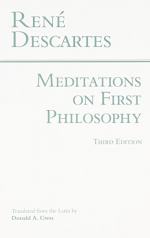|
This section contains 594 words (approx. 2 pages at 400 words per page) |

|
Meditations on First Philosophy Summary & Study Guide Description
Meditations on First Philosophy Summary & Study Guide includes comprehensive information and analysis to help you understand the book. This study guide contains the following sections:
This detailed literature summary also contains Topics for Discussion on Meditations on First Philosophy by Descarte, Rene .
The following version of this book was used to create this study guide: Descartes, René. Meditations on First Philosophy. Broadview Press, 2013. Translated by Ian Johnston.
At the start of six long meditations on the nature of knowledge, Rene Descartes introduces the fundamental question behind his philosophy; how can we know that any our knowledge is accurate? In order to conduct any science or philosophy, he suggests, we must first establish a secure foundation for our knowledge. In order to do so, he decides to adopt a type of methodological skepticism; he will doubt any type of knowledge if he can find the smallest possibility that it might be false. In a dramatic critique of our knowledge, he sets out three major reasons for skepticism. First, he cannot be sure that his senses portray the world accurately. Second, he cannot know that he is not dreaming. Third, he cannot know that there is not some evil demon deceiving him into believing things that are not true. As such, he decides to suspend all his belief in an external world and even in abstract mathematical objects.
Retreating from the external world and investigating instead the nature of his self, Descartes hits upon an absolutely certain principle: that he exists. We could never doubt that we exist, Descartes claims, since there must be something that is doubting and thinking. Since we must exist, Descartes continues to examine what we can know about ourselves. Drawing on thought experiments, he shows that any act of knowledge relies on a fundamentally cognitive judgments; seeing is not believing, since we must also interpret our vision. As such, he concludes that we actually know our thought better than the external world of chairs, trees, and air.
Descartes uses this fundamental principle to build his way up to a theory of knowledge that can justify our beliefs. The crucial step for Descartes is to show that something exists outside of his mind, particularly God, thereby building a bridge between his mind and the external world. To do this, Descartes develops two logical proofs that both establish the existence of God: one based on his idea of God and one based on the nature of God himself. Along the way, he develops several logical and metaphysical systems meant to help him in these proofs. These include a proof of the accuracy of reason, a hierarchy of reality, an examination of the nature between truth and falsity, and a theory of ideas and imagination.
Having established the existence of God, Descartes can finally turn back to the existence of real things. Since God exists and is all-benevolent, he would not allow an evil demon to exist, and so we can have some confidence in our senses and beliefs. Descartes examines the other reasons for doubt and finds ways to dismiss each of them. As such, he has by reason constructed a system of absolute certain knowledge and can safely contemplate of material things. After his skepticism, however, Descartes finds that the world he returns to is different than he previously supposed. His journey from skepticism to knowledge has demonstrated the truly mental nature of the self, and he shows that a purely physical picture of the world cannot accommodate this conception of the self, meaning that we must admit that there are also mental or spiritual substances. Having reaffirmed the power of reason and the certainty of our knowledge, Descartes concludes by counseling the reader of the dangers of error and to always think clearly and keep the existence of God in mind.
Read more from the Study Guide
|
This section contains 594 words (approx. 2 pages at 400 words per page) |

|



